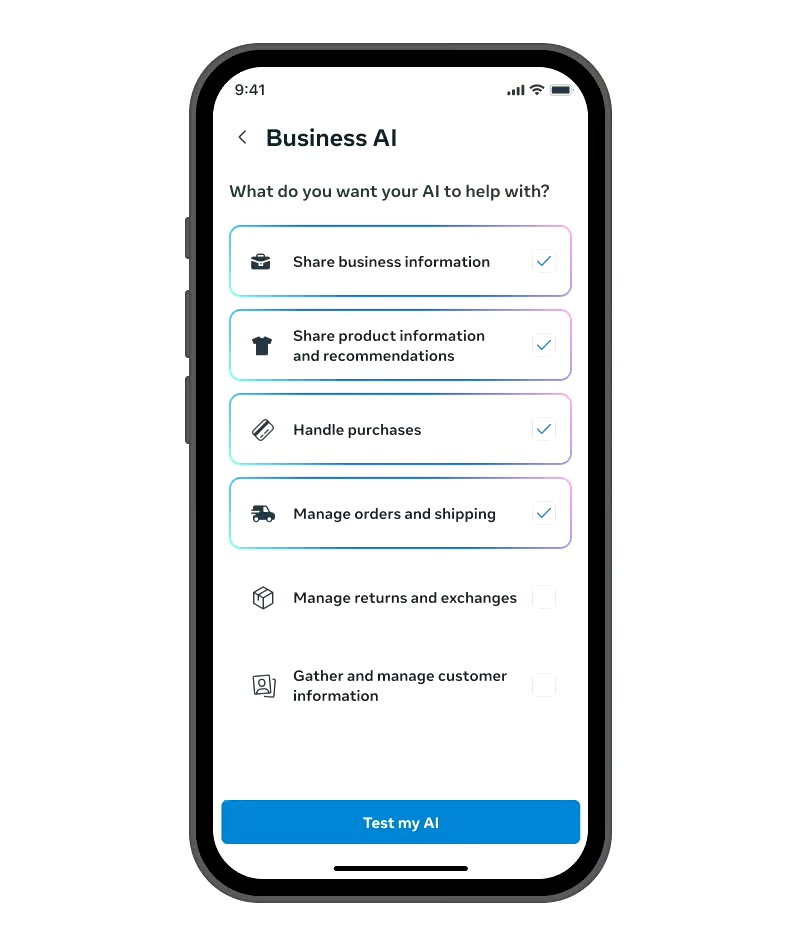Meta’s launch of Business AI represents the company’s boldest move yet to monetize artificial intelligence beyond traditional advertising revenue. Our expert team has analyzed this strategic platform launch to help you understand whether Meta can successfully compete in the crowded customer service automation market.
Our methodology involves competitive analysis, pricing evaluation, and integration capability assessment. We’ve examined Business AI’s positioning against established customer service platforms to provide actionable insights for businesses considering AI-powered support solutions.
Key Evaluation Criteria:
- Cross-platform integration and social media native advantages
- Pricing strategy and competitive value proposition
- AI personalization capabilities and training methodology
- Privacy implications and data usage policies
- Market timing and competitive differentiation
Top Picks Overview:
- Social Media Integration Champion: Native Facebook, Instagram, WhatsApp connectivity
- Competitive Pricing Leader: Free integration with Meta advertising
- Enterprise Partnership Specialist: Salesforce, Microsoft, ServiceNow collaboration

Social Media Integration Champion: Native Platform Advantages
Meta’s Business AI leverages the company’s unique position as owner of the world’s largest social media platforms, creating competitive advantages that traditional customer service providers cannot replicate.
Cross-Platform Connectivity: The seamless integration across Facebook, Instagram, WhatsApp, and third-party websites enables businesses to maintain consistent customer interactions regardless of touchpoint. This unified approach addresses the fragmentation that typically plagues multi-channel customer service strategies.
Training Data Advantages: Business AI learns from existing social media posts, advertising campaigns, and website content to deliver personalized responses. This social media-native training approach provides contextual understanding that generic customer service AI lacks.
Purchase Integration: The ability for customers to ask questions and complete purchases directly through Meta advertisements eliminates friction in the customer journey, potentially improving conversion rates for businesses already investing in Meta’s advertising ecosystem.
Competitive Pricing Leader: Strategic Market Entry
Meta’s pricing strategy demonstrates aggressive market penetration tactics designed to challenge established customer service platforms through cost advantages and advertising integration incentives.
Free Tier Strategy: Businesses integrating Business AI with Facebook and Instagram advertising receive free access, creating compelling value for companies already invested in Meta’s advertising ecosystem. This bundling approach reduces customer acquisition costs while increasing advertising platform stickiness.
Third-Party Site Pricing: While Meta characterizes their pricing for website deployment as “lower than market alternatives,” the lack of specific figures requires careful evaluation against established providers like Zendesk, Salesforce Service Cloud, or Intercom.
Market Disruption Potential: The free advertising integration model could force competitive pricing adjustments across the customer service automation industry, particularly affecting smaller providers without Meta’s advertising revenue subsidization capabilities.
Enterprise Partnership Strategy: Ecosystem Integration
Meta’s collaboration with major enterprise platforms signals serious intent to compete in the business customer service market rather than simply extending consumer AI capabilities.
Strategic Partnerships: Integration with Salesforce, Microsoft, ServiceNow, and Zendesk demonstrates recognition that complex customer inquiries require escalation beyond AI capabilities. These partnerships provide credibility and integration pathways for enterprise adoption.
Global Rollout Planning: The phased launch starting in Mexico and Philippines through WhatsApp and Messenger, followed by broader 2026 global deployment, suggests measured approach to platform scaling and localization challenges.

Privacy and Data Usage Concerns
Meta’s December 16 policy changes regarding AI conversation data usage for advertising personalization create significant considerations for businesses evaluating Business AI adoption.
Data Usage Implications: The inability for users to opt out of Meta AI conversation data usage for content and advertising personalization raises concerns about customer privacy and business liability for data handling practices.
Business Risk Assessment: Companies deploying Business AI must evaluate potential customer privacy concerns and regulatory compliance implications, particularly in jurisdictions with strict data protection requirements.
Strategic Recommendations
Meta Advertising Users: Businesses already investing significantly in Facebook and Instagram advertising should evaluate Business AI’s free integration for potential customer service cost savings and conversion improvements.
Privacy-Conscious Industries: Healthcare, financial services, and other regulated industries should carefully assess Meta’s data usage policies against compliance requirements before deployment.
Multi-Platform Businesses: Companies managing customer service across multiple social media channels may find Meta’s unified approach valuable, though vendor dependency risks require consideration.
Enterprise Organizations: The enterprise partnerships provide credible escalation pathways, though organizations should evaluate integration complexity and long-term strategic implications of Meta platform dependency.
Market Reality Check
Meta Business AI enters a mature customer service automation market dominated by established providers with proven enterprise relationships and comprehensive feature sets. While Meta’s social media integration and aggressive pricing create competitive advantages, success depends on demonstrating superior customer outcomes rather than simply lower costs.
The platform’s effectiveness for businesses outside Meta’s advertising ecosystem remains unclear, while privacy policy changes may limit adoption in privacy-sensitive industries. However, for companies already committed to Meta’s advertising platforms, Business AI represents a logical extension that could deliver meaningful customer service improvements at compelling price points.
Whether Business AI becomes a serious customer service platform challenger or remains a Meta advertising ecosystem enhancement depends on the company’s ability to prove enterprise-grade reliability and expand beyond its social media foundation.




Post a comment